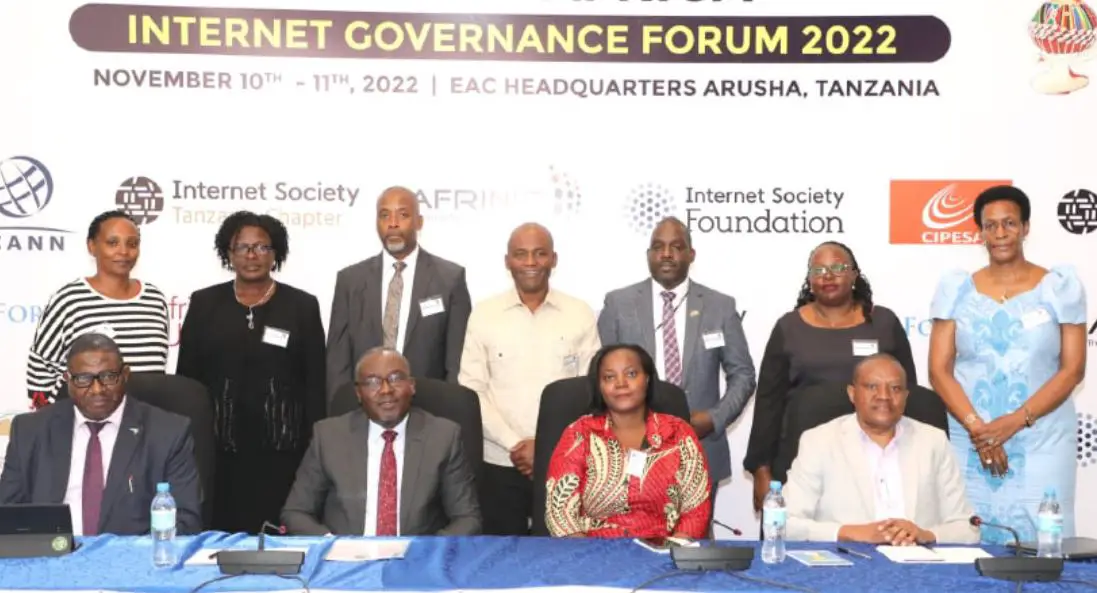Various government officials, industry experts and stakeholders from EAC bloc member states have convened in Arusha, Tanzania for the East African Internet Governance Forum (IGF).
The East African Internet Governance Forum (IGF) is a multistakeholder event, supported by the East African Community Secretariat.
The forum (November 10 – 11, 2022 ) is being held under the theme “A Resilient Internet for Shared Common Knowledge in East Africa.” It is taking place at the East Africa Community headquarters.
Discussions are focused on issues pertinent to enhancing Internet development in East Africa and Internet Governance issues.
Eng. Steven Mlote the EAC Deputy Secretary General told participants,”The EAC Vision 2050 has set a target to attain 95% penetration of Internet and mobile networks in the region, and 67% of individuals in East Africa using the Internet by the year 2050.”
Building an inclusive digital economy in East Africa
Across the world, digital economy has become a driving revenue avenue. In Africa, similar progress is being made as a result of the increased consumption of online services and increase in digital investments by both local and foreign actors.
However, it has also allowed for the emergence of some gaps and the widening of others. Access to finance, internet, networks remain stumbling blocks while longstanding inequalities like access to education, exclusion of youth, women and persons with disabilities limit their participation in the digital economy.
This session is looking at what is required to realise more inclusivity and participation in East Africa and Africa at large. It is exploring questions like, What is the current state of the digital economy in East Africa?
Which systems are or can be put in place to enable an inclusive digital economy in East Africa? What hinderance are the current limitations in the realisation of more usage and participation, access and trust in the digital economy?
What policy measures do we need to undertake to achieve a sustainable digital economy in East Africa?
Role of Policy makers in advancing internet development in East Africa
Over the last two decades, various policy efforts have been initiated with the goal of advancing technology access, use, and perception landscape in Africa.
This session is unpacking some of the more recent policy developments in respect to current technology trends, shifts and advancements.
Questions being explored include; What policy highlights have emerged that advance digital transformation a country level?
How are regional entities furthering developments made at a country level into efforts such as PRIDA, AfCTA, the Africa Data Policy framework?
How has the multistakeholder model been used to advance the various policy positions/interventions aimed at improving internet developments in East Africa?
Cyber security policy needs for East Africa
COVID-19 forced a fast track into cyber-security worldover. This session looks at the East African cyber-security landscape through a policy lens.
It is exploring prevailing cybercrime crime concerns, challenges and opportunities in addressing them as on cybercrime in general in addition to state jurisdiction.
Further, it explores how different countries are adopting and implementing cyber security interventions and how this affects potential collaborative efforts such as cross-border data transfer, data privacy concerns and the online fraud especially as we pursue greater digitalisation? the seeing will also discuss different investments respective countries are pursuing to finance their cyber security interventions.
Access and inclusion in East Africa
Access and inclusion are among the cornerstones of internet. However, through various forms of exclusion from the internet remains inaccessible for millions in East Africa.
This session seeks to understand why this remains the case and what efforts are underway to address the gaps.
Key questions being explored include -What are some of the prevailing concerns on access and inclusion in East Africa?
What efforts are different actors doing to address or advocate for increased access and inclusion?
How can we embrace emerging technologies such as AI, blockchain, metaverse etc without playing catchup? or should we define an internet that resonates with the realities of our developing countries?




















